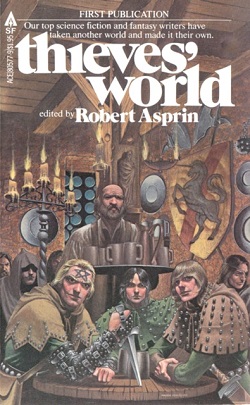There are very good reasons why the magic system in After Sundown doesn't work this way, and Assymetric Threat probably won't either. In both cases, having an infinite-variety wizard explosion is something you explicitly want to avoid.
But, let us suppose that did want to run a futuristic Ars Magica using the After Sundown engine. The purpose then is to support settings similar to Rifts and/or Shadowrun, with mages who can do an effectively infinite number of things, but not everything.
I'll express the other design goals in terms of the games which have them (in preference to pointing to fantasy novels, which have cool vignettes in them but are problematically vague):
Ars Magica: Especially in the surprisingly well-evolved and supported 5th edition, this game really delivers a lot in terms of making the wizards diverse, open-ended and playable.
One of the keys to this is that there are bonuses which are way bigger than the swing on the RNG. So once you can summon storms you can fly pretty-much automatically, and if all you can do is fly, you can't summon storms at all.
It also leverages the open-ended magic system into a number of sub-systems, especially for making magic items and having familiar spirits, which end up working reasonably well.
Goal 1 wrote: The rules will generate thresholds for a wide range of magical effects drawn from lists with many example difficulties and clear guidelines for adjusting those difficulties; large fixed bonuses (reductions in thresholds) will be used to differentiate levels of magic capability.
There are problems with the system, of course. Some spells are very useful to cast on the fly (Wall of Fire) while others are really useful to have permanently on a building (Protection from Weather). The same issue inevitably crops up when you have different resource management systems drawing from the same effect tables as well. But we'll hope that things are balanced enough that it will work out with a minimum of special cases.Goal 2 wrote:The magical effects will feed into (an arbitrary, expandable) number of subsystems to generate magical effects which are more complex than a spell which you cast.
Rifts, Paladium and Shadowrun: I'll fill in some elaboration later.
Goal 3 wrote:Using an alternative focus for your magical effects, such as brewing potions, performing rituals, drawing magical symbols on things, and so forth, needs to be a viable alternative vs. just casting spells.
Goal 4 wrote:Mages should have specialized training, which should give them special abilities that embed them in the fantastic elements of the setting (Astral Projection, Wards vs. Spirits, Ley Line Phasing, Sense Extradimensional Monsters, etc.)
WFRP: I'll fill in some elaboration later.Goal 5 wrote:Summoning of various kinds should be important and interesting, on an equal footing with other types of magical foci.
Goal 6 wrote:Wizards should have medium-sized splats. The spell system in WFRP is too limiting, but the conceptual space covered by each wizard splat (there are Fire Wizards who can manipulate literal fire and figurative fire in the form of anger or desire, but have no powers outside that sphere) is of the right size.
Runequest, Powers and Perils, and Stormbringer: I'll fill in some elaboration later.Goal 7 wrote:Risk of side-effects should be an acceptable resource management scheme; but the side-effect risk needs to be carefully modulated (so the perils of warp never straight-up kill you).
Goal 8 wrote:The magic system should be well-integrated into the cosmology; this is related to Goals 4 (integration with fantastic elements), 5 (balanced summoning) and 6 (medium-sized splats).
Goal 9 wrote:Different traditions of magic should be available, and they should have a wide range of effects on how your wizard plays, partially-independent of your choice of magical foci.
Crawl (the Roguelike) and Retromud (the MUD): I'll fill in some elaboration later.Goal 10 wrote:Unconventional combinations of foci, as for example in Stormbringer where you summon spirits, and make magic items by binding summoned spirits into them (yes I know that isn't actually how Moorcock's novels worked but it's a cool conceit nonetheless), should be possible and should flow in a sensible and balanced way from the previous points.
Goal 11 wrote:Major supernatural patrons splats should be a big deal and make substantial changes to what magic powers your wizard has and to how she interacts with the fantastic elements of the setting.
Goal 12 wrote:The fantastic elements of the setting should interact with mundane (or futuristic) skills in a synergistic way. The fantastic elements should be geared in such a way that representatives of different magical factions are both able to, and highly benefited by, joining the same party (street gang, cartel, band of mercenaries, whatever).

